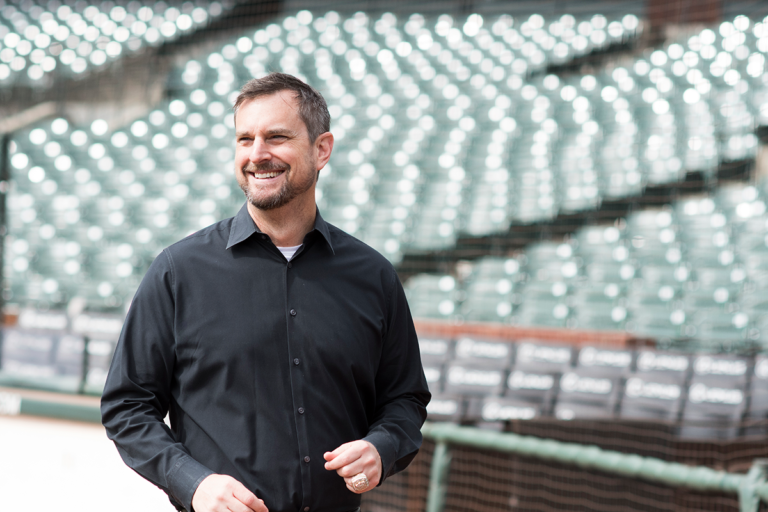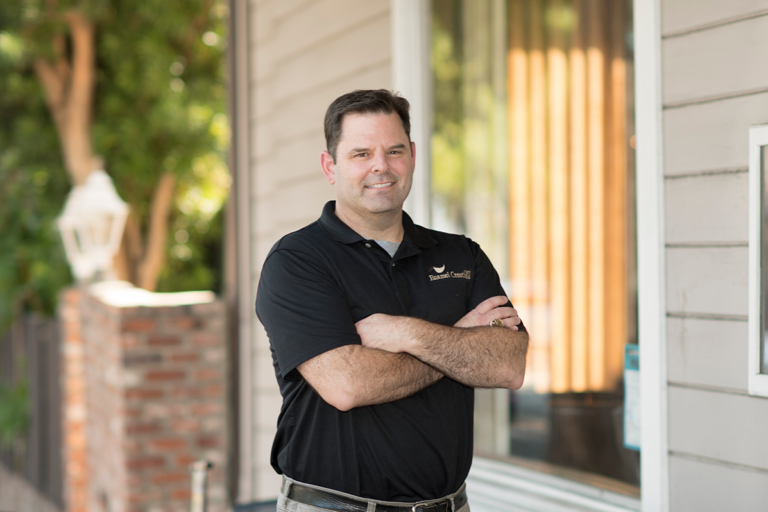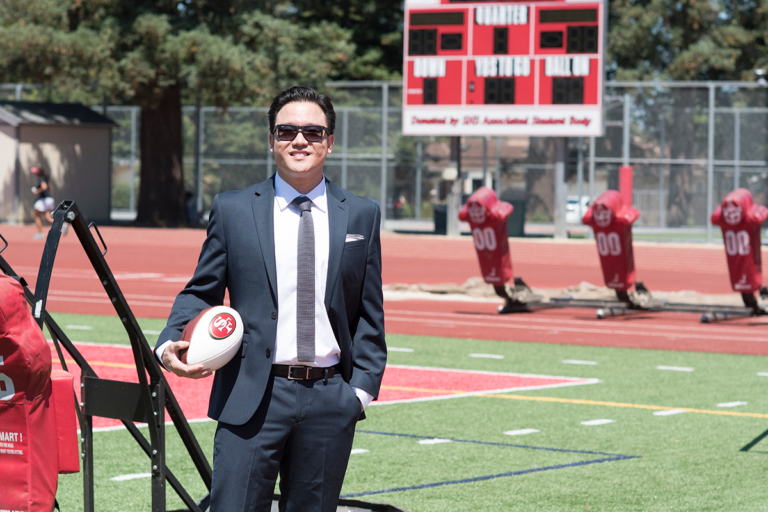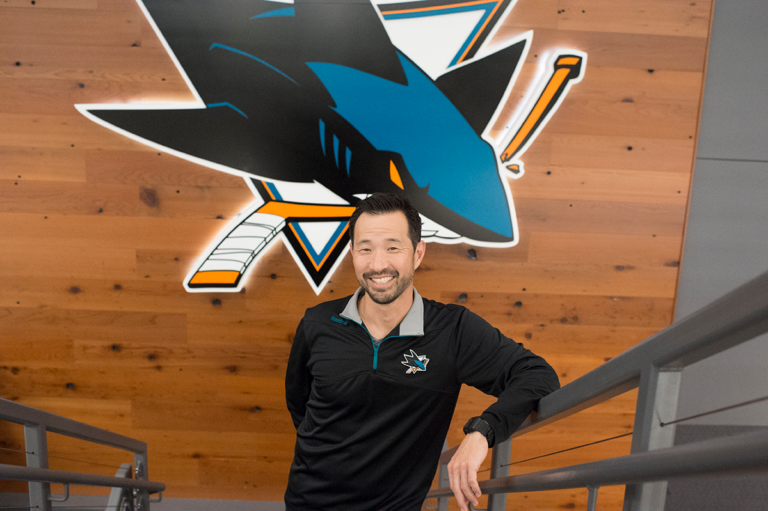by Kathleen A. Barrows
We are all familiar with classic images of our sports heroes: Stephen Curry, with a mouthguard hanging from his mouth. Or maybe it’s a hockey player sporting a toothless smile. But most fans don’t even know there’s such a thing as a team dentist for professional sports teams.
It wasn’t until 1983 that sports dentistry came into its own with the establishment of the Academy for Sports Dentistry. Now, aided by technological advances in equipment, more and more professional sports teams are paying attention to issues of players’ safety and dental health.
We interviewed four alumni of the Arthur A. Dugoni School of Dentistry, representing five professional teams in the Bay Area, who are responsible for the dental health of our local sports heroes, to better understand what their job entails and hear some amusing behind-the-scenes stories.
Dr. Samuel Thacher ’99 knew nothing about sports dentistry until about 10 years ago when a patient of his, at his private practice located a block from AT&T Park, asked if he was the San Francisco Giants team dentist. Intrigued, he called the existing team dentist, whose name, much to Thacher’s amusement, happened to be Dr. Les Plack. Plack became his friend and mentor. Thacher later took over the job in 2012, after attending his first Sports Dentistry Symposium in 2010. Today, his prized possession is a 2014 diamond-encrusted San Francisco Giants World Series championship ring.
[pullquote]Dr. Samuel Thacher ’99 knew nothing about sports dentistry until about 10 years ago when a patient of his, at his private practice located a block from AT&T Park, asked if he was the San Francisco Giants team dentist.[/pullquote]
Thacher admits that his job is “more boring than those other guys”—the team dentists who work with football, basketball and hockey players. Baseball-related dental injuries are rare as there is not a lot of violent contact involving the head and neck. Also, during the occasional times when players can’t rely on non-verbal signals, they don’t want a mouthguard to interfere with shouting, if necessary. The most common baseball-related dental issue stems from chewing tobacco.
Thacher finds the white striations on the inner lip that result from this habit occur in a much higher percentage of baseball players as compared to the general population, despite the efforts by Major League Baseball to curb tobacco use.
The Giants team trainers—Dave Groeschner and Anthony Reyes—are Thacher’s point of contact with the team. The league mandates that team dentists be on call for home games and conduct pre-season screenings, with most of the latter being done by Arizona-based dentists during spring training. Thacher has only had two instances of emergency sports-related trauma in his five years with the Giants.
Most of his interaction with the team, then, is for routine dental situations, such as exams and pain-related issues. He sees not only the players, trainers and coaches, but also their extended families, given that many players bring family members with them to the San Francisco Bay Area during the baseball season.
One of Thacher’s most memorable experiences as team dentist came in 2014 on the day the Giants won the pennant. One of the starting pitchers came into his office with a chipped tooth, after having opened a bag of sunflower seeds with his teeth. Within 15 minutes of his departure, the news of his dental procedure was all over social media. Later that evening when the pitcher ran out onto the field, blocking Travis Ishikawa from reaching home plate after a home run, the explanation was that he was still foggy from his morning dental visit.
As someone who has loved baseball since he played it as a kid, Thacher says his role is not about being “the dentist to the stars.” What he enjoys is “talking about baseball with the guys, one-on-one.” He keeps a wiffle ball and bat in his office, which he has used to take batting practice from a pitcher, and enjoys watching the fist bumps and man hugs exchanged between two baseball players crossing paths in his office. First and foremost, he says, “I’m a fan.”
Every Warriors fan can’t help but wonder how many mouthguards Stephen Curry goes through in a basketball game. One person who can answer that question is Dr. Todd Yerondopoulos ’96, team dentist for the Golden State Warriors and the Oakland Raiders. He’s a very busy man, attending all Warriors and Raiders home games, as well as three Raiders away games each season.
[pullquote]Every Warriors fan can’t help but wonder how many mouthguards Stephen Curry goes through in a basketball game.[/pullquote]
When Yerondopoulos first took over the job from Dr. Derric DesMarteau ’90, nine years ago before DesMarteau’s passing, only one professional basketball player used mouthpieces. Today, at least half the players on the Warriors team use the device. Now, “it’s cool to wear them,” he says, “even if, for Steph, it’s something to chew on rather than to protect his teeth.” He estimates having made “quite a few hundred mouthguards” during the star’s first four years with the team. Following the auction sale of one of his used mouthguards for $3,000, Curry once joked that they could both quit their jobs and make money just throwing them out to the fans.
But it’s not just about mouthpieces. Compared to football or baseball, dental injuries are more common in basketball—where elbows to the face can involve the teeth. It is Yerondopoulos who has final say about whether a player with a mouth injury can return to play. Sitting a couple of rows back from the court, he is always within eye contact with trainers should an athlete have a problem.
Similarly for Raiders football games, Yerondopoulos stands on the sidelines, arriving one and half hours before the game. He’s always ready for a text or call from the trainers, should a player lose a crown or temporary filling or need pain relief.
One of his favorite football stories relates to a lost tooth. Early on with the Raiders, during an away-game in Chicago, Yerondopoulos received a call at home during the third quarter while watching the game on TV. It was the team orthopedist asking what to do with a permanent tooth that had popped out when a player took a hit. Yerondopoulos immediately responded, “Put it back.” When the player appeared the following morning in his office, one of his front teeth was one centimeter longer than the others. Only then did Yerondopoulos learn that the player, without notifying anyone of the mishap, had first tried unsuccessfully to locate the tooth himself on the field. Referees miraculously found the tooth, but it only went back in his mouth after the player’s post-game shower. As it turned out, an implant was later required.
Yerondopoulos says, “Our office is not that much different from the average dental office. We just see more sports-related injuries, like chipped or avulsed teeth.” Of course his name is out there more, and his other patients may see an athlete sitting in the reception area. And with an 11-year-old son who plays basketball and baseball, he offers young athletes free, custom-made mouthpieces with the logo and color of their choice. “We’re just trying to keep them—the players and all our patients—healthy and happy.”
Dr. Mark Nishimura ’99, the team dentist for the San Jose Sharks admits that he didn’t know much about ice hockey until he joined the Sharks staff as team dentist. But now, after two seasons with them, he’s come to appreciate the quick pace and physicality of the game. “It’s a dangerous sport,” he explains. “When there’s a facial injury, it’s usually serious.” So he’s grateful for the amazing team of health professionals he works with: a general dentist, oral surgeon and endodontist, as well as an orthopedic surgeon, emergency doctor and family physician. “They are all available on a moment’s notice.”
Although hockey players wear helmets and visors, there is nothing else protecting their faces except for their mouthguards. A flying puck that can travel more than 100 miles per hour, a hit from the carbon fiber sticks used in the game or cuts from sharp skates or even the sharp edge of the player’s own protective face shield—all can cause serious facial injuries.
[pullquote]Although hockey players wear helmets and visors, there is nothing else protecting their faces except for their mouthguards.[/pullquote]
Nishimura’s primary function is “to get the player back on the ice as soon as possible.” In an emergency situation, this can consist of immediate treatment in the locker room 1) with no further follow-up; 2) with after-hours treatment at his office; or 3) with office time and further collaboration with specialists. Nishimura also provides general and preventive dentistry for the team and staff.
He laughs when he recounts a story about Brent Burns, who is known for his sense of humor. As he was walking Burns out of his office, the famous defensive player joked with some girls outside, warning them with his big toothless grin and pointing to Nishimura, “Do NOT go to that guy!” Luckily, the girls were the daughters of the dentist upstairs, who happens to be a Sharks season ticketholder.
Nishimura’s first introduction to sports dentistry came back in 2001 when he was training in Brazilian Jiu-Jitsu. He was asked to make a mouthguard for a then-unknown mixed martial arts fighter named B.J. Penn, who was making his debut in the Ultimate Fighting Championship. He’s been making mouthguards ever since.
Nishimura and his wife, Dr. Tiffany Kitamura ’99, run a family dental practice in San Jose. When he started his practice 12 years ago, he also signed up to provide dental services for the County of Santa Clara. In the public health setting, Nishimura was able to gain valuable experience with trauma and surgery, which would later help him as a National Hockey League team dentist. He still works two days a month for the county.
Hockey keeps Nishimura busy during the season. He is on call for 41 games a season and is present for most of the games, where he sits above the bench in seats accessible to the locker room or in the locker room itself. Though he has the option, he doesn’t travel with the team. Nishimura also oversees the San Jose Barracudas, the Sharks minor league hockey team.
After more than five years of treating one hundred National Football League players, coaches and office personnel, Dr. David Meng ’04 was selected as the official team dentist for the San Francisco 49ers earlier this year. It’s an appointment he calls “a privilege, honor and tremendous opportunity” and he hopes to continue working with the team for many more years to come.
[pullquote]After more than five years of treating one hundred National Football League players, coaches and office personnel, Dr. David Meng ’04 was selected as the official team dentist for the San Francisco 49ers earlier this year.[/pullquote]
An athlete his entire life, whose sports repertoire has included tennis, basketball, baseball, soccer, golf, swimming and skiing, Meng recalls having quite a few bumps and bruises over the years. He’s grateful to his parents for insisting that he always wear the appropriate protective gear and mouthguards. He still stresses how important it is for all athletes, both amateur and professional, to use properly fitted custom sports mouthguards to help prevent oral facial injuries.
He has also been an avid sports spectator and San Francisco 49er fan since childhood. His most memorable encounter treating atheletes was in 2013, when the 49ers played in the Super Bowl. Meng describes how a few days before the big game, many of the players came by his office to “prepare their smiles for the upcoming media attention.” The excitement was palpable, with the feeling of an “uplifting and cohesive camaraderie” shared by the players. “It was amazing,” he says “to partake in such a glorious moment with the NFL players.”
Meng has been a 49ers season ticket holder for years, a tradition he never plans to give up. During the games this season, however, it will be different. He will be sitting on the field, making sure the players receive the dental attention they need.
He and his wife, Kelly, a graduate of Pacific’s Thomas J. Long School of Pharmacy, work together at their Silicon Valley dental practice. They also have four young children, ranging in age from one to six years. Needless to say, when the time comes, their mouths will be well protected as they follow in their father’s footsteps.
Despite the differences among sports, the teams and their dental needs, the Dugoni School of Dentistry alumni agree—being a team dentist is exciting, fun and professionally satisfying. They are there to give the best quality care to the professional athletes and all their patients. And being a “member of the team,” no matter how time-consuming, is a wonderful extra perk.
Kathleen A. Barrows, an East Bay freelance writer, is a contributor to Contact Point.

San Francisco Giants: Dr. Samuel Thacher ’99 
Golden State Warriors and Oakland Raiders: Dr. Todd Yerondopoulos ’96 
San Francisco 49ers: Dr. David Meng ’04 
San Jose Sharks: Dr. Mark Nishimura ’99